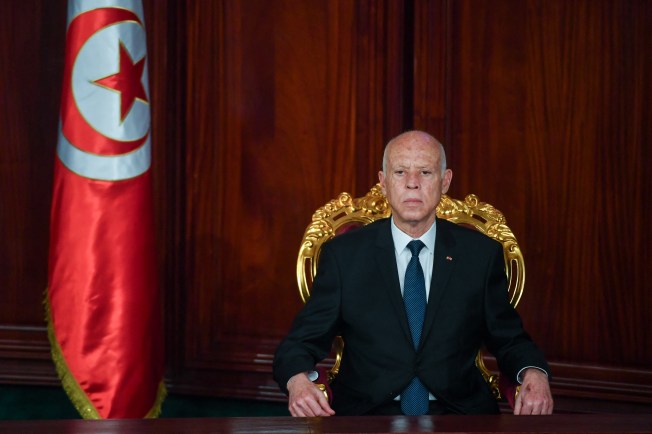Tunisia has reached a troubling milestone, with at least five journalists behind bars in CPJ’s December 1, 2024, prison census, the highest number since the organization began keeping track in 1992. Once hailed as a beacon of freedom in the Arab world after the 2011 revolution that sparked the Arab Spring, Tunisia is now erasing the gains it made as it stifles dissent and hampers the work of the press.
The government’s main tool against the media is Decree 54, a cybercrime law introduced by President Kais Saied in 2022 following his 2021 power grab in which he dissolved parliament, took control of the judiciary, and gave himself powers to rule by decree. The law makes it illegal to “to produce, spread, disseminate, send or write false news with the aim of infringing the rights of others, harming public safety or national defense or sowing terror among the population.” Today, four out of the five journalists imprisoned in Tunisia were convicted of violating the decree over their social media posts or commentary.
“Decree 54 has now turned every journalist into a suspect. It treats every journalist as if they are conditionally released from jail pending investigation, because they can be summoned for questioning at any time over anything they post online,” Ziad Debbar, president of local trade union the National Syndicate of Tunisian Journalists (SNJT), told CPJ.
Local journalists believe that authorities are using Decree 54 to quash investigative and critical journalism, and that many in the media are reverting to self-censorship.
“Decree 54 has been excessively applied to journalists, bloggers, and political commentators in the media,” Lofti Hajji, a founding member of SNJT, told CPJ. “This has led to a huge decline in political television and radio programs that once in abundance offered in-depth analysis of current political issues.” He said that journalists are loath to cover or speak out about the law, for fear that they will be charged under it.

Tunisian authorities stepped up prosecutions of journalists under the law ahead of last year’s October 6 elections, which Saied won by a landslide after jailing his opponents. On May 11, Tunisian authorities made three high profile media arrests. Sonia Dahmani, a lawyer and political commentator, was arrested when masked police officers raided the Tunisian bar association, where she had sought refuge after she sarcastically called Tunisia an “extraordinary country” attracting migrants on a television program. Dahmani was sentenced to one year in prison on false news charges under Decree 54. The sentence was later reduced to eight months on appeal, but she was subsequently sentenced to an additional two years in a separate conviction under the decree.
Dahmani’s colleagues, IFM radio journalists Mourad Zghidi and Borhen Bsaies, were arrested the same day last May. Bsaies was imprisoned under Decree 54 in connection with his television and radio commentary critical of the president and Zghidi over his social media posts in solidarity with journalist Mohamed Boughaleb. Both were sentenced to one year in prison after they were convicted of defamation and false news. Authorities have continued to pile on charges, investigating Zghidi and Bsaies for money laundering.
Prior to Saied’s 2021 power grab, journalists in Tunisia were protected by the press law, Decree 115, which abolished prison sentences for defamation and insult and enshrined protection of journalistic sources, and the 2014 constitution, which ensured freedom of expression. Local journalists say that journalists are vulnerable in new ways since the press law is no longer enforced and the freedom of expression clause of the constitution is not respected. Tunisia’s media regulator, the Independent High Authority for Audiovisual Communication, was hailed for its promotion of media independence, but Saied’s government forced the authority’s president, Nouri Lajmi, into retirement and suspended its activities in 2023.
Without a media regulator, the Tunisian election monitor, the Independent High Authority for Elections has stepped into its place, hampering the work of the press seeking to cover politics. In August, the monitor revoked the press accreditation of journalist Khaoula Boukrim, editor-in-chief of independent news website Tumedia, over her online coverage of the elections. As of early 2025, Boukrim’s press accreditation was still revoked. The monitor also filed dozens of legal complaints against media organizations and bloggers, and prevented some journalists from covering a press conference in September announcing the final presidential candidates in the 2024 race.
“The [election monitor] functioning as a media regulator during the elections was just utter nonsense,” said Debbar. He said the monitor “referred many journalists [to authorities] to be prosecuted under Decree 54 to punish them for their coverage of the elections.”
In 2025, Tunisian journalists are having a hard time envisioning a future of press freedom under Saied’s new term. Zghidi’s sister, Mariam Zghidi, told CPJ that when she visited her brother in prison that he defended his work – even though it had come at an extraordinary price.
“During my first visit to Mourad in prison, he said to me; ‘I am not a political activist, I am a journalist. And my job entails that I will show public support regarding some topics, but it also entails that I will be critical regarding others, which is my right as a journalist’,” said Mariam. “This is why he is in prison, because he was doing his job.”
